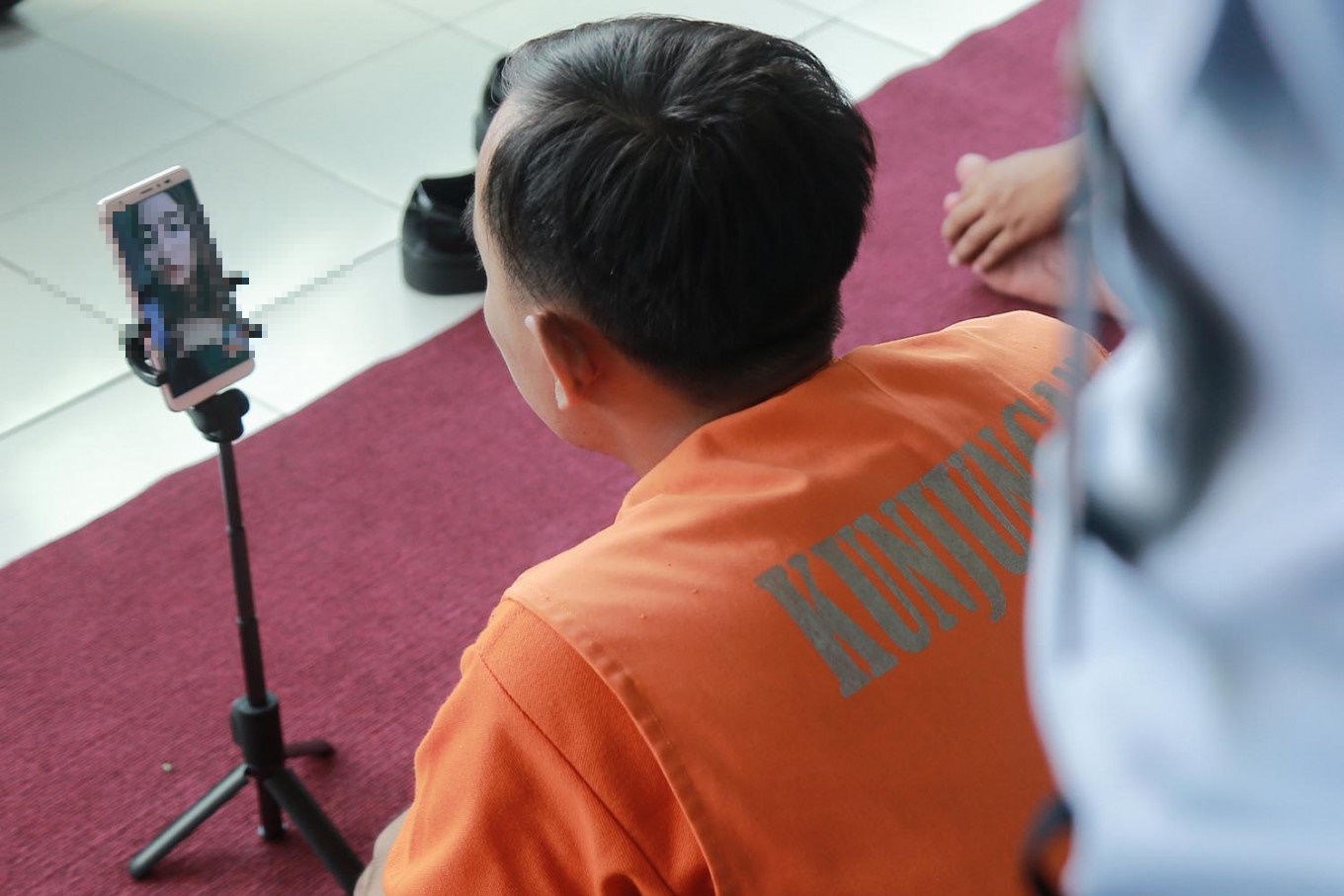
An inmate video chats with his family at a prison in Blitar, East Java, on March 17 after visits were stopped for two weeks to contain the COVID-19 pandemic. (AFP/STR)
JAKARTA — President Joko “Jokowi” Widodo’s call to practice social distancing to slow down the spread of COVID-19 is practically impossible to implement in the country’s overcrowded correctional facilities, making them particularly vulnerable to the illness.
As the number of inmates has outstripped the capacity of penitentiaries in almost all of Indonesia’s provinces, correctional authorities are scrambling to lower the risk of infection inside prisons, mostly by limiting prison visits.
Kerobokan men’s penitentiary in Bali, for example, has decided to ban all visitors until March 31 to protect inmates and staff as the novel coronavirus spreads outside. It holds 1,670 inmates, including 76 foreigners from 29 countries, far above its capacity of 352 prisoners.
“Unfortunately, it’s impossible for us to implement social distancing inside the prison as we don’t have the facilities to do so. That’s why we are focusing on preventing infection from outside and sterilizing the prison and all prisoners,” Kerobokan prison warden Yulius Sahruzah told The Jakarta Post on Monday.
“We have 1,670 people inside. That is too many. It is too risky even if a single inmate is ever infected.”
As of Monday, Bali had recorded six COVID-19 cases and two deaths, a British woman and a French man.
Family members and relatives of Kerobokan inmates can now only contact their loved ones through video calls provided by prison authorities.
Infrared body temperature scanners and hand sanitizers are provided in the jail, particularly for the prison guards to prevent them from bringing the virus to the penitentiary from outside. Authorities regularly spray disinfectant in the facility and have temporarily suspended empowerment programs for inmates involving religious communities and non-governmental organizations.
In Tanjung Gusta penitentiary in Medan, North Sumatra, a two-week lockdown is in effect. It began on Monday.
Tanjung Gusta warden Frans Elias Nico said that only lawyers were allowed to visit their clients during the period. The prison also offers a video calling facility for family members to contact inmates.
Lily, a Medan resident whose husband is serving a prison term in Tanjung Gusta, expressed her disappointment about not being able to visit her husband on his birthday later this week.
But she agreed that the lockdown was necessary given the COVID-19 pandemic.
“It’s sad that I cannot visit my husband in the penitentiary because of the lockdown. But it’s all right since I can video call,” Lily said.
There have been no confirmed COVID-19 cases inside prisons so far. But legal and human rights activists have been quick to warn the government that failing to act could expose the prison population to the coronavirus, particularly given the massive levels of overcrowding in Indonesian jails.
The country’s correctional facilities are notorious for holding inmates above their capacities. Indonesia has 524 penitentiaries and detention centers that, as of March 23, hold a total of 268,967 inmates, more than double the total capacity of 131,931 inmates, according data from the Law and Human Rights Ministry. Understaffing has also been a longstanding issue plaguing correctional facilities across the country, with Jakarta having only 806 guards to monitor more than 18,000 inmates. Bali and North Sumatra have 300 and 1,257 guards respectively, far lower than the number of inmates held in the two provinces.
Law and Human Rights Ministry acting corrections director general Nugraha has instructed correctional facilities across Indonesia to adopt precautionary measures that he said were essential to prevent local transmission from occurring inside prisons: temperature checks for visitors and guards and the regular disinfection of jails.
“No inmates have been detected as [COVID-19] ODP [people under surveillance] or PDP [patients under treatment],” Corrections Directorate General spokesperson Rika Aprianti said on Monday.
ODP is the government’s official term for people who have traveled recently in infected regions or have come in contact with confirmed COVID-19 cases but have not shown any symptoms. The PDP status is given to those already showing symptoms consistent with COVID-19 and already under medical care but whose statuses need confirmation with testing.
As of Monday, Indonesia had recorded 579 confirmed cases and 49 deaths. About 61 percent of positive cases were found in Jakarta, making the capital the epicenter of the pandemic in Indonesia.
Yet Rika said the inmates’ risk of contracting the disease remained low as their contact with the outside world had been limited even before the pandemic, brushing off concerns that social distancing was hard to implement in the overcrowded facilities.
According to Rika, Law and Human Rights Minister Yasonna Laoly has ordered the Corrections Directorate General to prepare at least one jail cell as a coronavirus isolation ward in each province to prepare for possible infections inside correctional facilities.
Institute for Criminal Justice Reform (ICJR) researcher Genoveva Alicia urged the government to consider releasing select inmates, particularly those in line for parole or at the end of their prison terms.
“There should be an assessment [to explore possibilities for the release of inmates], but such a measure should be done quickly. [Those] in line for parole should be accelerated,” Genoveva said.
She also cautioned the wardens to enact the visitor restriction policy carefully, saying that such a measure could lead to prison riots as inmates often relied on their family members to obtain basic necessities.